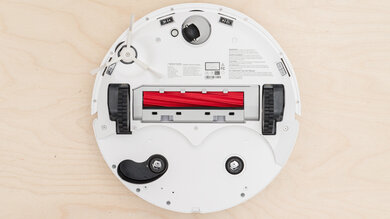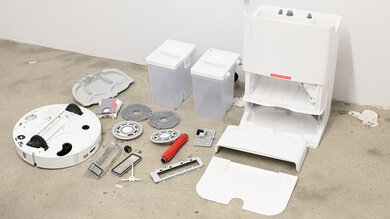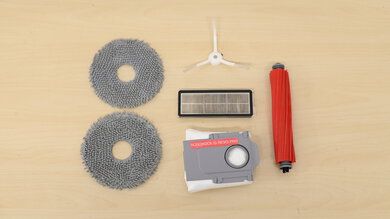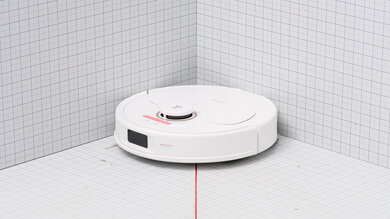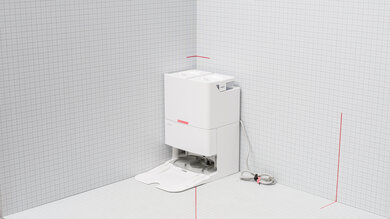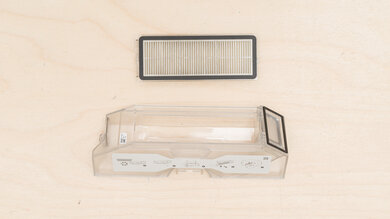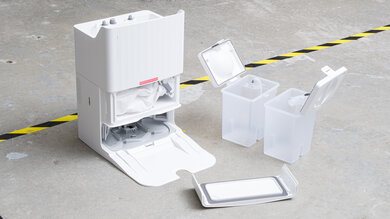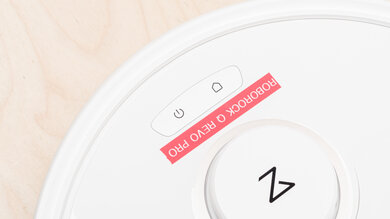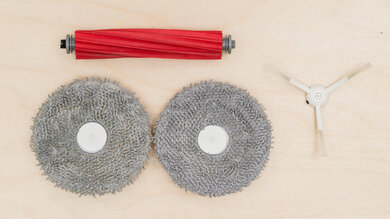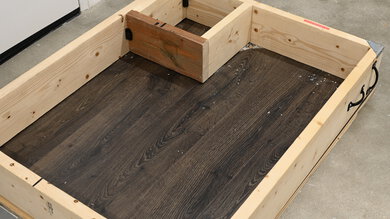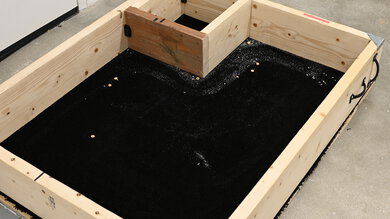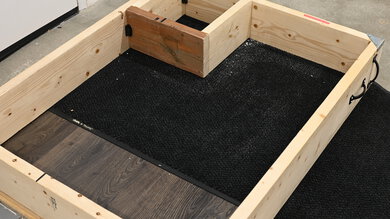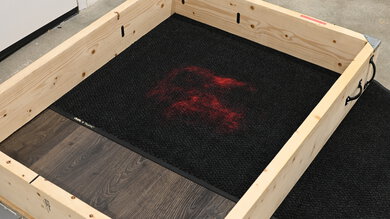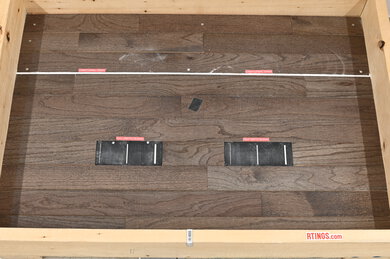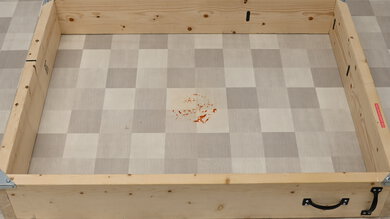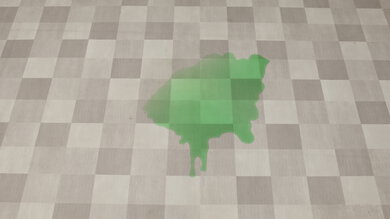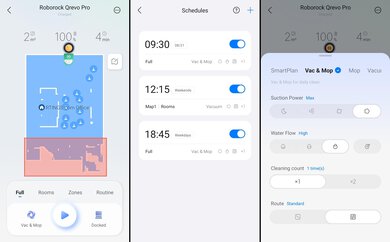The Roborock Qrevo Pro is a high-end robot vacuum. It's essentially an upgraded version of the Roborock Qrevo, with a redesigned FlexiArm Edge mopping system that swings out one of its mopping pads for improved stain-clearing performance along walls and in corners. It also has a more powerful suction motor and a mop lift system that can raise its pads even higher than the older model. Unlike the standard Qrevo, the Qrevo Pro's multifunction dock also heats the water for its mop-washing function to further sanitize the pads.
Our Verdict
The Roborock Qrevo Pro offers satisfactory performance overall in a multi-surface household. Its hard floor pickup is great, but its carpet cleaning is just okay since it struggles with fine material on carpets, especially pet hair. Its obstacle handling is bad, with an inconsistent obstacle avoidance system that works particularly poorly with small objects on carpet. However, it's better at detecting large objects in a bare-floored room. Fortunately, it comes with a well-appointed multifunction station that empties the dustbin, refills the mopping water, empties the spent mopping water, cleans and sanitizes the mop pads with hot water, and dries the mop pads with hot air. The mopping system delivers good results in cleaning up stains.
Multifunction dock reduces need for everyday maintenance.
- Good mopping performance.
Great hard floor pickup.
Good removal of medium and large debris on carpet.
Okay at detecting and avoiding large obstacles in a room.
Struggles with most pet hair on carpets.
Awful small object recognition and avoidance, especially on carpet.
Poor removal of fine material in carpet edges and corners.
Obstacle avoidance system behaves inconsistently.
The Roborock Qrevo Pro is an acceptable option for pet owners. It does a mediocre job of dealing with pet hair on carpeted floors, though its mopping system will be remarkably effective in clearing away any dirt or mud that your pet might track in, even along walls and in corners. Its rubber brushroll is easy to remove and clean, too. It runs quietly, which is a bonus if your pet is sensitive to loud noises. Unfortunately, it does a terrible job of sealing in fine allergens like pet dander.
Multifunction dock reduces need for everyday maintenance.
- Good mopping performance.
Lifts loose pet hair lying on top of carpet.
- Poor particle filtration performance.
Struggles with most pet hair on carpets.
The Roborock Qrevo Pro has great hard floor pickup performance. Though the side brush scatters debris at first, the robot vacuum passes over the floor thoroughly, picking up all fine, medium, and large material. It cleans edges pretty well too, leaving only a bit of debris in corners.
Great hard floor pickup.
Thorough pathing ensures it covers the entire floor surface.
The Roborock Qrevo Pro's performance on carpets is okay. It has no problem with medium-sized and large material, vacuuming most of it up, but it struggles with fine material. Its single rubber brushroll doesn't have sufficient agitation to lift fine debris out of carpet, and its suction is too low to move this embedded material on its own. Fine material sits too low in the carpet for the side brush to move either, so it gets left behind. This situation is worse along edges and in corners.
Good removal of medium and large debris on carpet.
Poor removal of fine material in carpet edges and corners.
The Roborock Qrevo Pro does a passable job at pet hair pickup performance. The rubber brushroll can lift some pet hair out of low-pile carpets, but it can't really dig in and lift it all out. It ends up pressing a fair amount of pet hair into the carpet and leaving it behind.
Lifts loose pet hair lying on top of carpet.
Struggles with most pet hair on carpets.
The Roborock Qrevo Pro has poor obstacle-handling performance. It's okay at detecting and avoiding large obstacles in a room, but it's awful at recognizing smaller objects, especially on carpets. Its obstacle-avoidance system behaves inconsistently, and it sometimes hits and drags objects like socks, occasionally sucking them up.
Okay at detecting and avoiding large obstacles in a room.
Awful small object recognition and avoidance, especially on carpet.
Obstacle avoidance system behaves inconsistently.
Performance Usages
Changelog
-
Updated Jul 17, 2025:
We added new types of obstacle avoidance technology to the Obstacle Avoidance test box.
-
Updated Apr 16, 2025:
We've added text to this review for the new tests added in Test Bench 1.0.
- Updated Apr 16, 2025: We've converted this review to Test Bench 1.0, which updates our performance testing to include new tests to evaluate Obstacle Adaptability, Obstacle Avoidance, Height Clearance, and Threshold Clearance. We've also introduced new performance usages. For more information, see our changelog.
-
Updated Mar 05, 2025:
We've mentioned the Dyson 360 Vis Nav as an option that has a clickable touchscreen displaying complete information for a similar price.
Check Price
Differences Between Sizes And Variants
There are two other models in the Roborock Q Revo lineup, both of which have different specifications and upgraded feature sets. It's important to note that these are mechanically different appliances that will perform differently. You can see the differences between them in the table below.
| Model Name | Advertised Suction Power | Intelligent Dirt Detection System | Mop Wash System | Mop Lift Height | FlexiArm Mop | FlexiArm Side Brush | Hazard Avoidance System |
|---|---|---|---|---|---|---|---|
| Roborock Qrevo | 5500 Pa | No | Yes | 7 mm | No | No | Reactive Tech |
| Roborock Qrevo S | 7000 Pa | No | Yes | 10 mm | No | No | Reactive Tech |
| Roborock Qrevo Pro | 7000 Pa | Yes | Yes, heated | 10 mm | Yes | No | Reactive Tech |
| Roborock Qrevo Plus | 7000 Pa | Yes | Yes | 10 mm | Yes | No | Reactive Tech |
| Roborock Q Revo MaxV | 7000 Pa | Yes | Yes, heated | 10 mm | Yes | No | Reactive AI |
| Roborock Qrevo Master | 10000 Pa | Yes | Yes, heated | 10 mm | Yes | Yes | Reactive AI |
We tested the Qrevo Pro model in its 'White' colorway; see its label label. Let us know in the comments if you come across another variant of this vacuum, and we'll update our review.
Popular Robot Vacuum Comparisons
The Roborock Qrevo Pro is an updated variant of the standard Roborock Qrevo, which is a fairly capable higher-end robot vacuum. The Qrevo Pro is a feature-packed unit, bundled with a multifunction dock that empties its dustbin, refills its water tank, and washes and dries its mop pads, and it has LIDAR navigation combined with real-time hazard avoidance. Its updated mopping system, which features a swing-out mopping pad to clean closer to walls, represents a minor convenience not found on the older Qrevo. It isn't all upsides, however: the Pro model's reduced filter area seems to have a slight compromise on airflow, negatively impacting debris-pickup performance.
The Qrevo Pro isn't as full-featured as the flagship Roborock Qrevo Curv and lacks the Curv's extendible side brush and lifting capability. The Pro is also a step down from the Dreame L40 Ultra since it doesn't have the Dreame's extendible side brush, and its obstacle avoidance system isn't as advanced. That said, it does outperform the Dreame on most cleaning tasks.
If you're looking for alternatives, see our recommendations for the best robot vacuums, the best robot vacuums for hardwood floors, and the best robot vacuums for carpet.
The Roborock Qrevo and the Roborock Qrevo Pro are similar machines but offer slightly different strengths. From an ownership perspective, they feel similar, and there's little overall difference in regular maintenance. The Pro model's FlexiArm extending mop makes it the better option if you want a more capable option for dealing with stains, especially along walls and in corners. Its updated multi-function dock might have slightly lower-capacity water tanks, but it's also fractionally shorter and less noisy. Unlike the standard Qrevo, its dock also heats the water used to clean its mopping pads to sanitize them more thoroughly.
The Roborock Qrevo Pro is better than the eufy X10 Pro Omni. Both vacuums boast a similar feature set, with real-time hazard avoidance, onboard mopping systems with mop pad lifts, and advanced multifunction docks that empty the vacuums' dustbins, wash and dry their mop pads, and refill their water tanks. However, the Roborock charges faster while offering a similarly impressive battery life, and provides better debris-pickup performance on carpeted floors. That said, the eufy's hazard avoidance system is noticeably more consistent in spotting and reacting to obstacles, especially on bare floors.
The Roborock S8 MaxV Ultra is a more advanced vacuum than the Roborock Qrevo Pro. The MaxV is a better-built unit with a far more advanced and reliable hazard navigation system. That said, if you don't need that feature, the Qrevo Pro is worth a look, as it provides similar debris-pickup performance and better overall mopping performance by virtue of its twin-pad mopping system.
The Roborock Qrevo Curv sits atop the Qrevo line-up and presents a few notable improvements over the Roborock Qrevo Pro. Get the Curv if you primarily have hard surfaces in your home or have many tall thresholds separating your rooms. It offers superior hard surface pick-up performance thanks to the addition of the FlexiArm system on its side brush, allowing it to deliver exceptional cleaning along walls and in corners (the Pro model only sports this feature on its mop), and its all-new AdaptiLift system provides superior maneuverability over obstacles up to 4 cm tall. Mopping performance also sees a slight boost thanks to the Curv's superior debris recognition. That said, the Curv offers no notable advantages over the Pro if you primarily have carpets.
Test Results

The Roborock Qrevo Pro feels impressively well-built. It's very similar to the standard Roborock Qrevo in this respect, with a sturdy, dense-feeling construction. Its top cover has a glossy finish, which tends to attract quite a few fingerprints, while its bumper and lower half have a matte finish.
Like its cheaper stablemate, the mop pads are held in place with magnetic pegs, but in the Pro model's case, the right-most mop mount moves outward in a slight arc so that it can clean deeper into corners. This mechanism feels quite robust, with minimal play or jiggle within the system. There are a few downsides, however: finer debris can get into the hinges for its dustbin cover to the point where it doesn't close fully. This has no impact on the operation of the vacuum, but it does look pretty unseemly, especially for a higher-end model like this. If you're looking for a Roborock model that feels even more solidly built than this, you'll want to step up to the Roborock S8 MaxV Ultra.
The multifunction dock also feels similarly sturdy to the vacuum. However, it's worth noting that it is very large since it not only has an integrated dirtbag for solid debris but two water tanks: one is for refilling the vacuum's internal water tank, while the other holds wastewater collected after the dock has rinsed the vacuum's mopping pads.
The Roborock Qrevo Pro has a reasonably high number of components that need to be cleaned periodically, but on the upside, they're pretty easy to access. Components that are often used, like the brushroll, dustbin, and vacuum filter, can be removed without the need for any tools, and cleaning them is simple. It doesn't take much hair to cause the brushroll to jam, but it also doesn't have any bristles for hair to get stuck. As for the filter, its dense pleats tend to collect a lot of debris, so it's best to rinse it to clean it properly. Unfortunately, you do need to unscrew the side brush with a Phillips-head screwdriver, and you'll need a flat-headed screwdriver to lever the omnidirectional wheel out of place.
The multi-function dock takes quite a bit of the sting out of everyday maintenance since it not only empties the vacuum's internal dustbin but also refills its internal water tank and washes its mopping pads with heated water and dries them. That said, this dock also incurs its own set of maintenance requirements. You'll need to dispose of its dirtbag, wash out the dirty water tank periodically, and refill its clean water tank. The dock also features a separate cleaning tank and water filter for the mop washing element at the base of the dock. Once again, however, these parts don't take much time to access.
If you'd like to read a breakdown of the maintenance procedures involved with this vacuum, you can read the maintenance guide online. Roborock also has a series of videos detailing maintenance procedures for the Roborock Qrevo MaxV on their YouTube channel, which requires similar overall requirements. Here are the videos for maintenance and servicing, cleaning the dustbin and filter, and emptying and maintenance of the dock.
This vacuum incurs high recurring costs.
- Brushroll: You'll need to replace the brushroll after 300 hours of use or every six to 12 months. Replacements can be purchased on Roborock's website.
- Side brush: The side brush has a service life of 200 hours or approximately three to six months of use. You can buy a two-pack of replacements from the company's website.
- Filter: The filter needs replacing following 150 hours, according to the maintenance tab of the companion app, or every six to 12 months. You can buy replacements in packs of two.
- Mop pads: You should replace the mop pads every one to three months. Replacements can be purchased online.
- Multi-function dock dirtbag: The dirtbag has an advertised capacity of 2.7L. Replacements can be purchased on Roborock's website.
Much like the standard Roborock Qrevo, the Roborock Qrevo Pro takes up a fair amount of space. While the vacuum itself isn't big, its multifunction dock certainly is since it has to fit an internal dirtbag, two water tanks for clean water and wastewater, and a dryer for its mop pad. There's a groove at the back of the dock for storing any excess length of power cable. It's worth noting that this multifunction dock is fractionally shorter than that of the standard QRevo, as its water tanks have a smaller capacity of 4.25L rather than 5L.
This vacuum's internal dustbin is pretty small. It's fractionally larger than that of the older Roborock Qrevo but firmly on the smaller side. It'll need to return to its dock to self-empty at the end of almost every cleaning session. There's no fill sensor; you'll instead get regular reminders on the Roborock companion app to check the dustbin.
The Roborock Qrevo Pro has a multifunction dock. It can self-empty into disposable 2.5L dirtbags and has a pair of 4.25L water tanks: one for clean water to refill the unit's internal water tank and wash the mopping pads and the other for waste water from the mop washing process.
These tanks are slightly shorter than those from the Roborock Qrevo's dock, meaning that the unit has a slightly smaller 3552 sq ft (330 sqm) cleaning area before you need to refill the clean water tank, compared to the 4305 sq ft (400 sqm) that the older Qrevo can cover.
Unlike cheaper models in the Qrevo lineup, the Qrevo Pro's docking station doesn't only heat the water used to dry the mop pads, it also heats the mop washing water to better sanitize the pads.
- Roborock Qrevo Pro vacuum
- Dirt compartment
- Multifunctional dock
- Multifunctional dock base
- Multifunctional dock cleaning tank
- Multifunctional dock cleaning tank filter
- Clean water tank
- Dirty water tank
- Multifunction dock power cable
- 2x disposable dirtbags
- Dirtbag compartment cover
- Cleaning tank
- 1x washable filter
- 1x rubber brushroll
- Brushroll guard
- 2x mopping pads
- 2x mopping pad mounting plates
- Quick start guide and user manuals
This vacuum's battery performance is superb. It uses the same 5200 mAh lithium-ion as the Roborock Qrevo and, unsurprisingly, has a similar runtime. In its low-power 'Quiet' mode, it can run for a little over four hours, which gives it plenty of time to deal with lightweight debris. Its battery life drops to just under two hours in its high-power 'Max+' mode. This is still enough time to deal with stubborn messes on surfaces like carpet. This vacuum also features an 'Off-Peak Charging' function, which allows the vacuum to recharge only during peak hours for power demand to save on electricity costs. You can keep track of the vacuum's battery status by checking the indicator light at the top of the vacuum, which changes color and pattern depending on the current charge status.
The Roborock Qrevo Pro is a feature-packed robot vacuum. Like the older Roborock Qrevo, it has an Auto-Mop Lift feature to raise the mop pads on carpeted surfaces so that it can run vacuuming and mopping jobs within the same cleaning cycle. However, the system has been upgraded for this unit, and it now raises the mopping pads by 10mm instead of 7mm. The upgrades to its mopping system also include its swing-out arm, which can get the mopping cloth further into corners and along walls.
There are also a variety of carpet-specific cleaning functions: 'Carpet First' mode has the vacuum clean carpets before anything else in its cleaning cycle to prevent them from getting wet, while the 'Deep Carpet Cleaning' mode has the vacuum run on carpets twice at a higher suction power level setting. You can also have it avoid carpets entirely. You can manually choose between its five different power level settings and two different vacuuming route modes.
Its SmartPlan AI system is a pretty unique selling point; the manufacturer advertises it to allow the vacuum to automatically select the optimal vacuuming and mopping modes for different rooms. For instance, if in a bedroom, it would automatically change to the 'Quiet' power setting and 'Gentle' mop setting, whereas it would increase its suction and mopping intensity in a tile-floored kitchen.
There are also a variety of mopping options. You can choose between three water flow levels for its mopping pads: 'Low,' 'Medium,' 'High,' and 'Custom.' There are also four levels of route mapping settings, which effectively allow you to choose between fast and deep mopping on a sliding scale.
The Qrevo Pro also features Roborock's Reactive Tech system, the company's entry-level hazard avoidance technology. It features a front-facing structured light sensor to spot hazards, but this type of sensor ultimately isn't as sophisticated or as effective as the RGB-color camera-based system found on the Roborock S7 MaxV. For an even more feature-packed option, consider the Dreame L40 Ultra.
The Roborock Qrevo Pro's performance on hard floors is great. It's very effective in handling a variety of solid debris on hard floors, ranging in size from whole cereal pieces to grains of rice, though it can leave behind a small amount of finer debris like sand. If you want something that can handle corners better, consider the Roborock Qrevo Curv.
Similar to the Roborock Qrevo S, we encountered inconsistent debris pickup performance on this surface type. When we first ran this unit through this test, it fell substantially short of the nominally less powerful Roborock Qrevo. We ran this test again, and the vacuum delivered significantly better overall results despite no change in settings or vacuum behavior. This triggered an internal investigation to determine the cause of this performance discrepancy; we'll update the review once we've identified the most likely culprit.
The Roborock Qrevo Pro delivers decent performance on high-pile carpet. It's very good at dealing with medium-sized debris like rice. It's reasonably effective in clearing away larger material like cereal on this surface type, though you might want to have it run another cleaning session to clear away finer debris like sand that's been worked into this surface type, especially along walls and in corners.
Note: We initially encountered some difficulty testing this vacuum on our black sample carpet due to the vacuum's cliff sensors triggering, which would cause it to stop moving and miss entire sections of the floor. This isn't necessarily something that will impact most people, but it's worth noting that this vacuum can have trouble maneuvering on especially dark-colored surfaces.
The Roborock Qrevo Pro's performance on low-pile carpets is okay. It's quite effective in dealing with large- and medium-sized debris like cereal or rice, but it'll need to make an extra pass to deal with finer debris that's been pressed deeper into carpet fibers, especially in corners and along walls.
The Roborock Qrevo Pro's pet hair pickup performance on low-pile carpeting is fair. It'll clear away lighter strands of hair lying on top of carpeting but will struggle with strands that have been embedded a little more deeply, so you might want to run several cleaning cycles if you have pets that shed heavily. On the upside, its rubber brushroll is quite easy to clean.
This vacuum's airflow performance is good overall for a robot vacuum, though hardly a step up from the older Roborock Qrevo, despite its claim of having a more powerful motor. This difference could be attributed to the Qrevo Pro's smaller filter opening when compared to the older model, which can have a negative overall impact on airflow.
This vacuum is incredibly quiet. You'll hear what people nearby say even when the vacuum runs in its most powerful suction mode within the same room.
The multifunction dock is noisier than the vacuum when using the self-empty function, with a peak volume of 69.5 dBA, though this does make it quieter than the Roborock Qrevo's dock.
The Roborock Qrevo Pro's ability to adapt to large obstacles is reasonable. It spends a fair amount of time spinning in place to determine its position in the room, but it generally covers the room thoroughly. Its obstacle avoidance system works fairly well at detecting tall, thin objects like floor-length mirror frames and coat rack legs, though it may bump into them a bit, nudging them around. It does eventually mark them as obstacles and cleans around them.
It generally has a problem with low, horizontal obstacles like horizontal chair legs. It frequently gets caught up on them, needing manual intervention.
It doesn't recognize loose rugs with tassels as obstacles and may get tangled up in them, so it would be best to keep these out of its way.
Though this robot vacuum is equipped with a 3D-structured light-obstacle avoidance sensor, it isn't very effective, especially on carpets. Its obstacle avoidance is awful; the system behaves inconsistently.
It generally avoids larger objects like pet bowls and shoes on bare floors and gives them adequate clearance. It's inconsistent with smaller objects like socks and, unfortunately, pet waste—it might avoid these, or it might push them around, run them over, or suck them up.
It hardly ever recognizes or avoids small, thin objects like USB cords and usually gets tangled up in them, requiring manual intervention. It's hit-and-miss with loosely coiled extension cords too. It also has great difficulty avoiding small, low-lying objects like socks and pet waste on carpets.
The Roborock Qrevo Pro's protruding LIDAR sensor prevents it from going under furniture with low clearance, but it will be able to go under some furniture with high clearance.
This robot vacuum is able to climb short and moderately tall thresholds, but its collision bumper is triggered by 1" tall objects, so it won't attempt to climb objects taller than that.
The Roborock Qrevo Pro does a poor job of sealing in fine particles. Fine allergens can bypass its exhaust filter and are blown straight out of its exhaust port and LIDAR sensor.
Like many other robot vacuums, the Roborock Qrevo Pro struggles with debris in cracks and crevices. Its side brush tends to drag debris outwards instead of directing it toward the suction inlet. Running the vacuum in the 'Max+' suction mode makes little to no difference in terms of performance in this regard.
The Roborock Qrevo Pro's stain-clearing performance is good, with the water flow mode set to 'High' and the pathing set to 'Deep+.' Its rotating mop pads are exceptionally effective in scrubbing away dried-on stains, and the FlexiArm extending mop design allows for a much closer clean along walls and in corners compared to most conventional hybrid vacuum/mops.
The multifunction dock's mop-washing process is impressive. After the vacuum has finished mopping, it'll park at the multifunction dock, where the pads are cleaned with water heated to 128.4°F (53.3°C) before being dried with a flow of warm air. You can see how the pads looked before the automatic clean cycle and after the clean cycle.
The dock also has a 'Dirt Detection' feature, which will send the unit back out for another mopping run, depending on how dirty the mop wash water is.
This vacuum has a broad array of physical automation features. Its multifunction dock eliminates a lot of the normal day-to-day maintenance requirements that come with a robot vacuum, as it empties the vacuum's dustbin, refills its water tank, washes its mop pads with heated water, and dries its mopping pads.
There are two physical control buttons that you can use to perform basic functions, without having to use the app. The power button doubles as a general 'Clean' button, sending the vacuum off to map your home and start a cleaning session. You can press the 'Home' button to send the vacuum back to its base station. Holding down the 'Home' button engages the spot cleaning function, in which the vacuum will clean a small area around itself.
The similarly priced Dyson 360 Vis Nav has a clickable touchscreen that displays more information instead.
The Roborock app has a remarkably dense feature set; see its interface.
After it's mapped out your home, you can set up no-go zones, designate specific cleaning zones to spot clean, split, merge, and name those areas, manually set the surface type for different areas, and set the suction and mopping modes you want for individual rooms and even tweak the order through which it moves through each room. You can also set 'Entrapping Areas,' zones where the vacuum will slow down to minimize damage on delicate surfaces, like door thresholds and steps. It also offers multi-level mapping for up to four floors.
You can adjust its 'Less Collision' mode through two different modes, which causes the vacuum to avoid contact with walls and furniture at the expense of lower-precision scanning in tight spots.
The app also has a 'Help' sub-menu that gives you a projected service interval for its filter, brushroll, side brush, sensors, and mopping pad.
There are also quite a few configuration options for the multifunction dock. You can adjust the frequency of mop-washing cycles, the mop-washing intensity, and the mop-drying cycle length. You can also adjust how often the vacuum will return to its dock to self-empty depending on the size of your home or simply leave it up to the vacuum itself.

